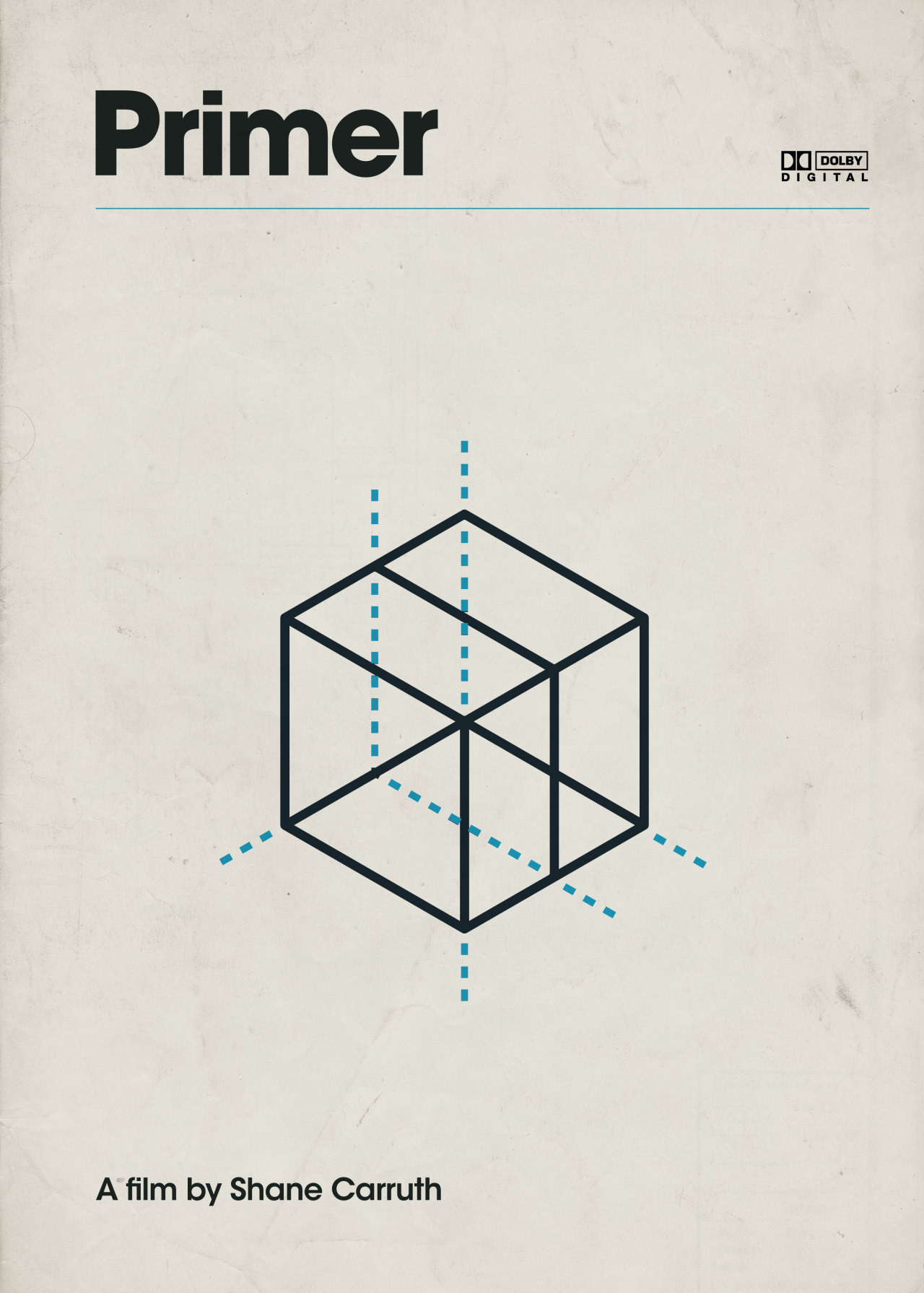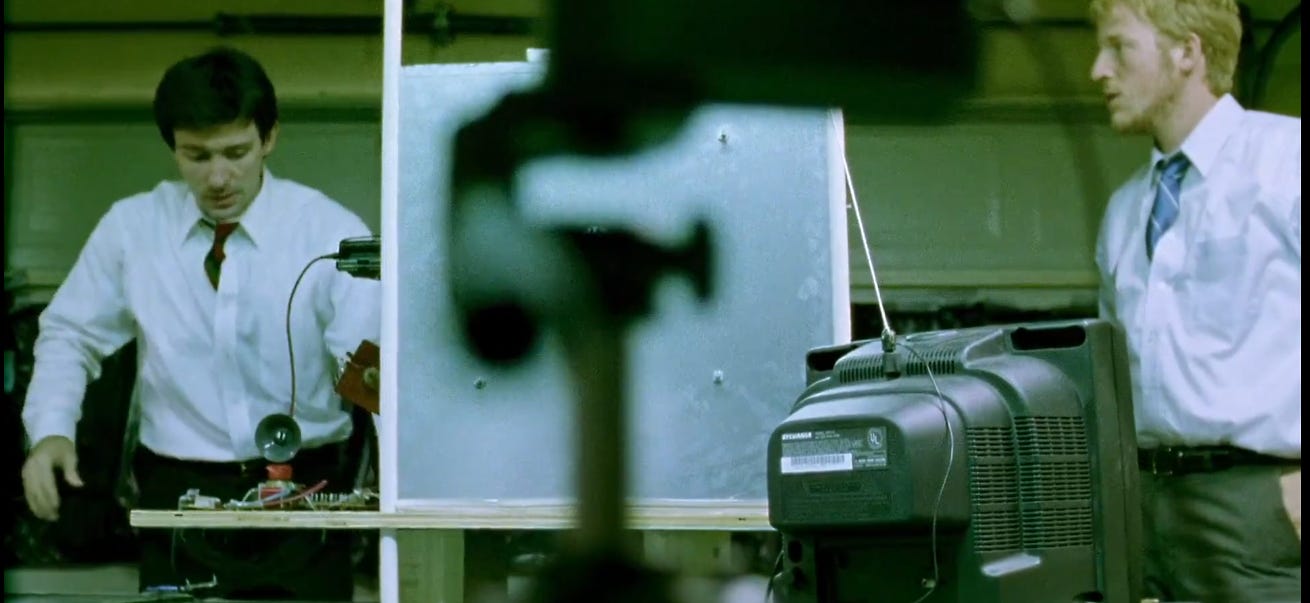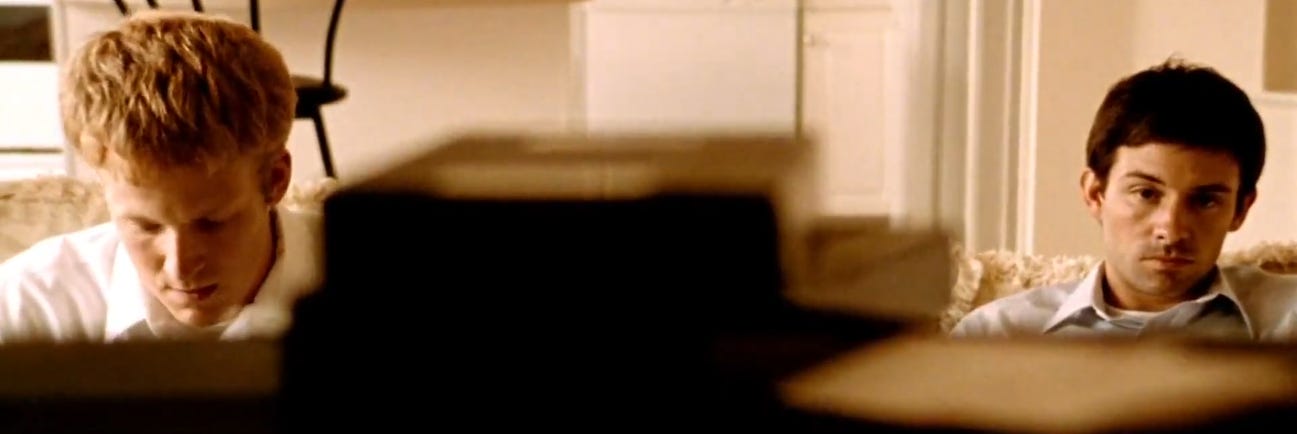Primer: The Lie That Becomes the Loop.
Performance, Paradox, and the Loops That Build a Man
00:00:01 // Cold StartThe First Revision
People told me to watch Primer.
They said it was dense. Confusing. Brilliant. A mind-bender you have to earn your way through.
No one said it would feel like shame on loop, like watching two men loop themselves not toward revelation, but toward erasure.
Not spectacle. Not paradox. Just two men who disappear into storage units and hotel rooms, not to save anyone, but to rehearse the version of themselves they wish had existed.
Primer is a 2004 indie film about two engineers who accidentally invent time travel in a garage. But this isn’t spectacle. It isn’t paradox. It’s about performance.
This piece is what I saw when I watched it for the first time. Every still, every pillar, every timestamp, recorded mid-playback. Not objective. Not resolved. Just my loop. Just my cut. The clean one.
What if the edit wasn’t a lie, but a wish?
00:14:06 // First InsertionThe Lie Rehearsed
He loops the moment.
Not to change it.
To land it.
We watch Aaron circling a basketball around his waist, again and again, while a conversation from earlier overlays the image. It’s not a flashback. It’s a rehearsal. The scene doesn't replay because it's important. It replays because he’s trying to believe it was.
This is how he works:
Tape the moment.
Insert the earpiece.
Play himself back to himself until the performance feels lived-in.
Not a reaction. A recitation.
He doesn’t fix the past. He curates it. Maybe he’s not performing for them. Maybe he’s stabilizing for himself.
Down to the tone. Down to the line delivery.
He doesn’t just want to be good, he wants to be seen as already having been good.
Just like this essay.
That's the loop.
Not time. Not causality.
Identity, layered.
He builds boxes, not for invention, but for self-verification.
And like any good myth, it’s not complete until it has an audience.
He tells Rachel he saved her.
Not because it mattered.
But because he needed her to say “thank you” with the right kind of eyes.
He didn’t stop the man with the gun when he could’ve. He let it play out. Not recklessly, but deliberately. Because a clean rescue doesn’t leave a witness. The loop wasn’t safety. It was setup.
His wife doesn’t buy it. She never did.
She says, "Finally, my husband the hero."
Maybe it’s before the party. Maybe after.
It doesn’t matter.
What matters is:
She sees the myth before he builds it.
And still, he builds it anyway.
Aaron loops the tape until the lie feels earned.
Most of us don’t have a time machine. But we still rewrite the past in our heads. Not everyone records their edits. But we all rehearse. We tighten our posture. We rerun the scene. We loop, hoping next time it lands right. Some do it for an audience. Some for a therapist. Some when they’re alone and can’t sleep.
It’s not time travel. It’s theater. Maybe performance is the original.
And the man in the lead can’t stop whispering his lines until they echo back clean.
00:14:06-b // Duplicate ArrivalMasculinity Without Witness
They loop again.
Not to save someone.
Not to undo harm.
Just to make sure the story sounds better this time.
This is where Abe enters, not as foil, but as mirror.
If Aaron is the actor, Abe is the director:
watching from the rafters, deciding which version to keep.
They work together.
But they don’t trust each other.
Because trust would mean not needing the loop.
They have wives. Children. Homes.
And yet they vanish into hotel rooms.
Not to hide, but to rehearse.
To stage heroism in private until it can be broadcast clean.
Their bodies stay tethered to the real world, but their attention is elsewhere, on the loop, the playback, the perfect line delivery that never quite arrives.
They don’t loop to be seen.
They loop because intimacy doesn’t offer rewrites.
But writing does.
So ask yourself: why do you reread this line?
Abe built his box first.
Ran his loop alone.
Then let Aaron think it was a shared discovery.
And when the loop fails to stabilize, their bodies crack:
the blood in the ear. The stagger. The slip.
It’s not paradox.
It’s burnout.
Because this isn’t performance for applause.
It’s performance to avoid being known.
It’s not collaboration. It’s a custody battle over the past.
And Abe brought the lawyer.
If the loop is defiance, defiance for whom? If the loop is agency, whose agency rewrites whom? Because when narrative space is taken without consent, it’s not a rehearsal, it’s erasure. And yet, only they get to rehearse. Rachel doesn’t get a loop. The wives don’t get a fail-safe. The box opens only for the ones who already had the frame.
Rachel doesn’t ratify the loop. She dignifies the myth. That’s her function, in Aaron’s design.
When he lets the gunman go, stages the rescue, he doesn’t save her. He stages proximity to her fear. He needs her “thank you” more than her safety.
And the wife? She sees it. Doesn’t even flinch.
“Finally, my husband the hero.”
It isn’t sarcasm. It’s indictment. A line delivered like a curtain drop.
The machine never offers her a loop. No fail-safe. No backup. No silence to rehearse inside.
It’s not just that Rachel and the wives lack screen time. It’s that the technology itself is coded against them, closed to those who weren’t already authorized by the myth.
The loop is not a marvel. It’s a gate.
And only those written into the first draft of the frame get to revise.
After the hotel rehearsals begin, the film never cuts back to home. To bedrooms. To dinners half-eaten.
That isn’t oversight. It’s orchestration.
Domestic space is erased because it doesn’t serve the performance.
The lives Aaron and Abe vanish from aren’t just missing, they’re withheld.
That’s how you protect a myth:
You leave no witnesses.
You write no loops for the ones who’d name the rehearsal.
You vanish the home, so the hotel can look like origin.
01:00:44 // Feedback BloomSound Without Clarity
The body warns first.
Blood from the ear.
Static in the feed.
Abe sways like a man hearing himself out of sync.
The loops are precise.
The machines are engineered.
But the language collapses.
They talk over each other.
Jargon smothers meaning.
The sound mix mirrors the ethics: layered, incoherent, impossible to isolate.
You don’t get a clean signal when no one’s listening.
Aaron explains with density.
Abe responds with silence.
Neither hears the other.
This isn’t collaboration.
It’s semantic decay.
The more they speak, the less they understand.
The more loops they run, the fewer versions remain intact.
This is the cost of recursive authorship:
a chorus with no melody, just overlaid takes screaming for coherence.
Not music. Not dialogue.
Just noise wearing the mask of method.
01:17:29 // Fail-Safe DetonationThe Director’s Cut
The last box is buried first.
Abe builds it without telling Aaron. Like a backup of himself. Like a man who knows collaboration ends in collapse.
We call him the cautious one. The moral center. The man who tried to undo it all.
But Abe loops too. Not to rehearse, to overwrite.
He isn’t salvaging trust. He’s preloading his version. Prepping the playback.
He doesn’t stop Aaron. He just ensures that when it all goes wrong, the version of him that’s remembered was the one who warned us.
That’s not ethics. That’s editorial control.
He builds the fail-safe box not for safety, but for sovereignty. A timeline where he gets to be the one who tried.
The voice of reason, cut from the footage just before the damage.
But the blood comes anyway. The system glitches. The narrative splits.
Aaron flees. Abe fractures. The boxes multiply.
And still, no one goes home.
Because once you start curating identity through loops, you don’t live forward. You just script cleaner takes.
No box stops the blood. No loop preserves the truth. Abe’s fracture proves it. Even the director doesn’t get the final cut.
Unless he writes the review.
Unless he loops it again, this time in prose, and calls it ‘analysis.’
Unless the final cut isn’t the film, but the reading we pass off as truth.
This one.
Right now.
Consider subscribing or don’t. The loop will still run.
If Primer is the loop as identity rehearsal, then Timecop and Tenet are the loop as law.
00:00:00 // Citations + ContextWorks Cited
Primer (2004), Shane Carruth, screenplay, direction, editing, sound design.
Goffman, Erving. The Presentation of Self in Everyday Life. Anchor Books, 1959.
Butler, Judith. Gender Trouble: Feminism and the Subversion of Identity. Routledge, 1990.
Ahmed, Sara. The Cultural Politics of Emotion. Edinburgh University Press, 2004.
Audio mix critiques sourced from various reviews and viewer commentaries published between 2004–2024.
Acknowledgments
This essay was shaped through direct engagement, comments, contradictions, and recursive reads. It came together cleanly. Thank you to those who pushed me to look again.
Particular thanks to those who saw the myth under the method and asked: What if the loop isn’t about truth at all?
Disclaimer
This isn’t a definitive reading. It’s a performance.
If Primer taught me anything, it’s that every playback is a reconstruction.
This one just happens to be mine.
[REDACTED]








Well, I wasn't primed for this.
This movie managed to create one of the most grounded yet complex forms of time travel ever put to screen, glad to see it getting attention decades later!